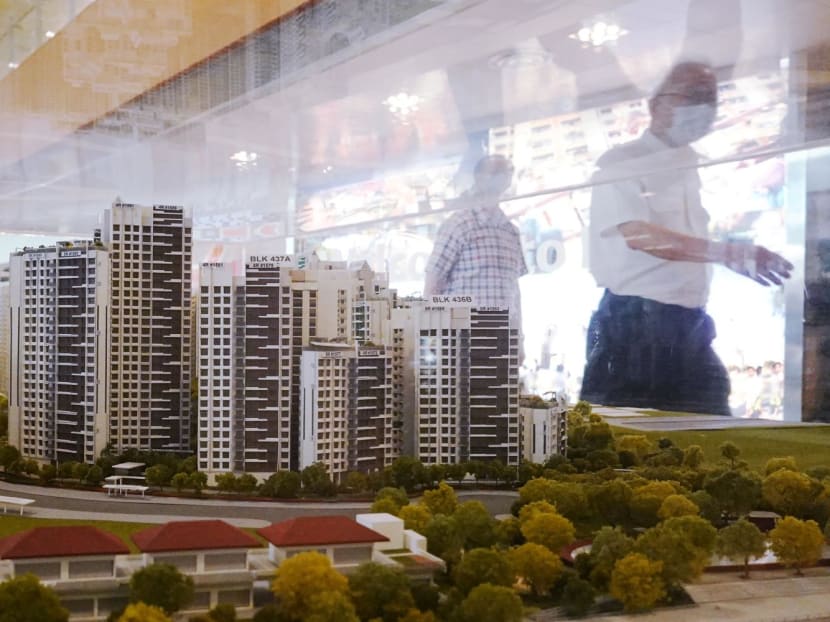PSP proposes land cost to be excluded from prices of BTO flats; PAP MPs say it will distort public housing market
SINGAPORE — Non-Constituency Members of Parliament (MPs) from the Progress Singapore Party (PSP) proposed on Monday (Feb 6) that prices of new public housing flats exclude the land cost. This suggestion was shot down by Members of Parliament (MP) from the ruling party who argued that such a plan would worsen demand for flats in prime areas or reduce the equitable access of flats to first-time homeowners.

A model of new public housing blocks on display.
- Parliament debated two motions on public housing policies
- The first was tabled by National Development Minister Desmond Lee and the second by the Non-Constituency MPs from PSP
- Among PSP's proposals were to exclude the land cost from new flats, and for sellers to repay this cost with interest when they sell the flat
- Several PAP MPs said that the proposals could further increase demand for flats in prime areas or reduce the equitable access of flats to first-time homeowners
- During the debate, MPs also spoke of capping the prices of four-room BTO flats to five times the median income of a household
SINGAPORE — Non-Constituency Members of Parliament (MPs) from the Progress Singapore Party (PSP) proposed on Monday (Feb 6) that prices of new public housing flats exclude the land cost.
This suggestion was shot down by Members of Parliament (MP) from the ruling People’s Action Party who argued that such a plan was not feasible and would further increase demand for flats in prime areas or reduce the equitable access of flats to first-time homeowners.
This was during a debate for a parliamentary motion on affordable and accessible public housing, tabled by National Development Minister Desmond Lee. A separate motion on public housing policies was also filed by Non-Constituency MPs Leong Mun Wai and Hazel Poa of PSP.
During his speech, Mr Lee said that the Government remains committed to providing affordable and accessible public housing for Singaporeans, even though the housing supply has become tight and resale prices have risen due to the Covid-19 pandemic.
A total of 10 MPs across the aisle and one Nominated MP spoke during the first day of this debate, with several noting that the housing needs and aspirations of Singaporeans had changed over several generations.
Ms Denise Phua, MP for Jalan Besar Group Representation Constituency (GRC), said that Singapore has become a victim of the success of its public policy, with Singaporeans viewing owning a Housing and Development Board (HDB) flat as a rite of passage and entitlement.
Similarly, Ms Cheryl Chan, East Coast GRC MP, pointed out that the demand pattern and lifestyles of the newer generations have had an impact on the affordability of and accessibility to public housing. For example, younger people want to live separately, but near their family, driving up the price of flats within the estate.
PSP’S PROPOSALS
Mr Leong and Ms Poa put forth two proposals during the debate.
The first was an "affordable homes scheme" where Singaporeans may buy a Build-to-Order (BTO) flat at a “user price”. This price would include the construction cost of the flat and a “notional location premium”.
At the point of purchase, the land cost for the flat will be made known and recorded with HDB.
The land cost will be recovered when the owner sells the flat in the resale market after the required five-year Minimum Occupation Period.
This means that as long as people are buying HDB flats to live in the units, they should not have to pay for the land cost. "They should only pay the land cost when they take the HDB flats to be an investment and sell it for a profit,” Mr Leong said.
He cited the example of a S$350,000 BTO flat in Tengah, where a buyer will only pay the user price of about S$140,000, with the balance of S$210,000 in land cost to be paid later when the flat is sold.
The second proposed scheme was a "millennial apartments scheme", where the Government will keep a “large stock of quality rental flats” near the Central Business District with affordable leases of two to five years for young Singaporeans.
Mr Leong also spoke of several concerns about the present BTO system. He said that even though the Government has said that BTO flats are affordable and most buyers may use their Central Provident Fund (CPF) savings to service their monthly property loans, this comes at the cost of depleting their CPF savings for retirement and other needs.
Both Mr Leong and Ms Poa also said that the shortage of BTO flats and high resale prices could have a negative impact on the total fertility rate in Singapore, since married couples with potential plans to start a family are unable to secure a house due to long waiting times for BTO flats and high prices.
Ms Poa suggested that the Ministry of National Development (MND) track waiting time from the point when a couple first applies for their BTO flat to the point of collection, rather than from the point of a successful BTO flat booking to the collection.
She added that the system now makes it difficult to grasp how long couples have to wait for a flat from the time they decide to marry each other to the time they get the keys to their first flat.
WHAT OTHER MPS SAY
Several PAP MPs criticised PSP’s proposals, particularly its suggestion to exclude land cost from prices of new flats.
Mr Vikram Nair, a Sembawang GRC MP, said that the land costs of BTO flats are currently not passed on to buyers. Instead, the flats are priced based on a variety of factors linked to affordability, such as loan serviceability and ratio of income to price.
Under PSP's proposal, the way a BTO flat is priced could create "severe market distortions", said Mr Nair.
At the time the flat is launched, it would appear very cheap. This would particularly be the case in prime areas where the demand for flats could "well explode", he added.
This will in turn exacerbate the “lottery effect” (where buyers make significant gains from the sale of their flats), such that buyers who get the prime area flat will feel happy and people who lose out will feel resentful.
But when flat owners need to sell their flats, they will have a huge bill to pay in terms of land cost, paying more than what they paid for the flat initially, Mr Nair added.
Families may then not be able to sell their flats if they cannot stump out a large amount of cash.
Making a similar point, Jurong GRC MP Xie Yao Quan said that under PSP’s proposed scheme, first-timers buying a resale flat would also have to pay the full market value of the flat. He questioned if this provided equitable access to public housing for first-timers.
He also asked about the impact of PSP's affordable homes scheme on resale prices and whether Mr Leong agrees that "he seriously risk risks crashing the resale market instead of keeping it buoyant, as he has claimed?"
"How can you expect to keep the resale market buoyant with such a shock?" said Mr Xie.
On PSP's proposal to offer rental housing for young Singaporeans, Mr Nair said that HDB should continue to prioritise building flats for those who need BTO flats first, given the limited supply of flats.
If the demand for BTO flats has adequately abated, the Government can consider providing rental homes, although rental housing should be prioritised for families in financial difficulty, he added.
Other PAP MPs who questioned PSP’s proposals during the debate were Mr Murali Pillai, MP for Bukit Batok, Mr Sitoh Yih Pin, MP for Potong Pasir, and Ms Phua, Jalan Besar GRC MP.
Nominated MP Cheng Hsing Yao said that given Singapore’s limited land resources, land should be safeguarded as a reserve.
If the value of land is not factored into the cost of public housing, it would create an “open loop” for the land value to be given away for free. This will result in some parts of society enjoying a significant windfall from free land, while other parts of society will pay for the windfall.
Factoring in the land cost for a flat will prevent undue windfall for certain people only.
MORE PROPOSALS
To improve the public housing system, MPs also offered other suggestions:
- Mr Xie proposed capping the prices of four-room BTO flats to five times the median income of a Singaporean household, or just under S$500,000 before grants
- Ms Chan asked if MND could increase the Minimum Occupation Period for BTO flats in mature estates so as to prioritise buyers who genuinely need a flat
- Ms Phua suggested building more appealing towns, with better residential concepts and education facilities, for example, away from popular estates. This will help to shift demand away from mature estates
The debate on the two motions will continue on Tuesday, with 12 more MPs expected to speak.
INTRODUCE MORE PUBLIC RENTAL FLATS, BUILD NEW HOMES ON BROWNFIELD SITE: WP MPS
Given the "high prices of public housing" in Singapore, what is needed is “a reset” via a “gentle path to a new normal”, Workers Party (WP) Member of Parliament (MP) Jamus Lim said.
One way to do so is to introduce limited-duration public rental flats that may be leased for a maximum of 10 years. This “will ensure a roof over the heads of those families who wish to eventually own but allow them to wait out until the market reset is complete”, Associate Professor Lim said.
The Sengkang Group Representation Constituency MP was speaking during a debate on two separate motions on public housing filed by the National Development Minister Desmond Lee and the Progress Singapore Party.
He said that higher than average inflation in the last two years has led to a jump in home prices. Escalating prices of Housing and Development Board (HDB) flats would also mean that the Government would need to spend more taxpayer monies in subsidies to keep the flats affordable.
He added that the land price component of a Build-to-Order (BTO) flat “may be overvalued” if it is indirectly derived from the HDB resale market. He suggested that a way to price land without reference to the market is to peg it as a multiple of median salaries of workers.
Doing so would ensure that HDB can “drive affordability” and not try to catch up with the market with subsidies.
Speaking during the same debate, another WP Sengkang GRC MP Louis Chua said that although HDB has boosted the supply of BTO flats by 35 per cent last year, demand remains high.
This suggests that “the level of demand supply imbalance remains a critical concern”.
He said that about half of the sites used for public housing developments in the last 10 years were on greenfield sites.
HDB could look at building more flats in brownfield sites or those in existing housing estates, since this will be faster than building in greenfield sites that require more land preparation work and takes a longer time to complete, he added.















